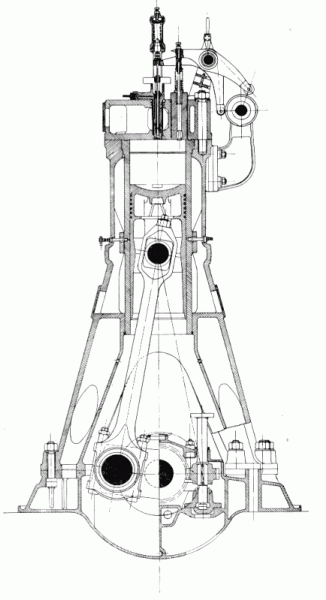Today, we meet Rudolf Diesel. The University of Houston's College of Engineering presents this series about the machines that make our civilization run, and the people whose ingenuity created them.
No other engine inventor's name is as closely tied to his engine as Rudolph Diesel's is. But Diesel worked hard to make it that way. Historian Linwood Bryant tells us that Diesel saw himself as a scientific genius and the James Watt of the late 19th century. He was vain, oversensitive, and not a little paranoid. He didn't win the hearts of other engine makers.
In 1912, 20 years after the engine was conceived, four books were written about its development. Diesel wrote one. The other three were by people who were out to minimize his claims.
The seeds of the dispute, Bryant argues, were sown in Diesel's view of invention -- the usual view that a device is first invented, then developed, and finally improved. Diesel left very clear records of what he actually did. There's no doubt that between 1890 and '93 he invented the engine using his knowledge of thermodynamics. The idea of burning fuel slowly, and at higher pressures, was certainly his.
There's also no doubt that he worked from 1893 to '97 at the Augsburg Machine-Works to develop a working engine. During this time Diesel faced problem after problem. To solve them he had to do a lot more theoretical work and more invention. In Diesel's view, he was still inventing the engine. People outside the process saw all this as development -- the dirty work that anyone has to go through to make a good idea into workable hardware.
After 1897 Diesel figured he was done with his invention, and he turned to promoting it. But the engine was woefully unready for the market. Eleven more years of improvement and innovation were needed. Meanwhile, Diesel worked himself into a nervous breakdown promoting the not-yet-ready engine.
Now the 1912 controversy becomes clearer. Diesel saw his own development as a continuation of the inventive process -- and it most surely was that. But what went on from 1897 to 1908 -- the innovation that made the engine commercially feasible -- that he viewed as no more than simple clean-up work by lesser minds. He irritated other engine designers by sneering at their work. He failed to see that what made his engine viable in the marketplace was a lot of truly inventive thinking by a lot of good engineers.
Diesel was badly troubled by the criticisms. And in 1913 he vanished from a boat to England. His body was found ten days later. His death brought out all kinds of lurid stories about plots to sell secrets to the British. But it's pretty clear that he only committed suicide. All Diesel's concern over public opinion was such an unhappy thing! A person with that kind of talent should've known how to sit back and enjoy it.
I'm John Lienhard, at the University of Houston, where we're interested in the way inventive minds work.
(Theme music)
Bryant, L., The Development of the Diesel Engine. Technology and Culture, Vol. 17, No. 3, October 1976, pp. 432-446.
Chalkley, A. P., Diesel Engines for Land and Marine Work (with an introductory chapter by the late Dr. Rudolf Diesel). New York: D. Van Nostrand Company, 1917.
This episode has been greatly revised and extended as Episode 1435.

(From Diesel Engines for Land and Marine Work, 1917)
A Single-Cylinder 80 HP Diesel Engine